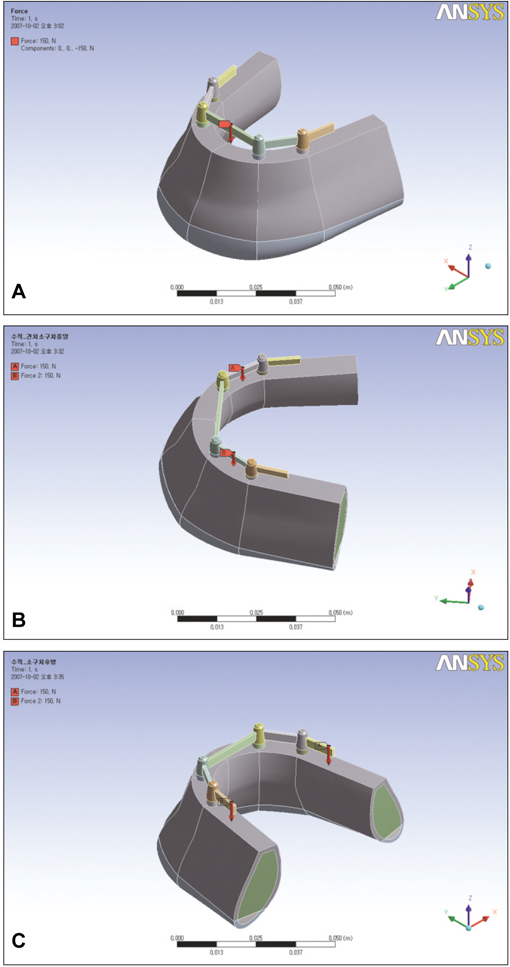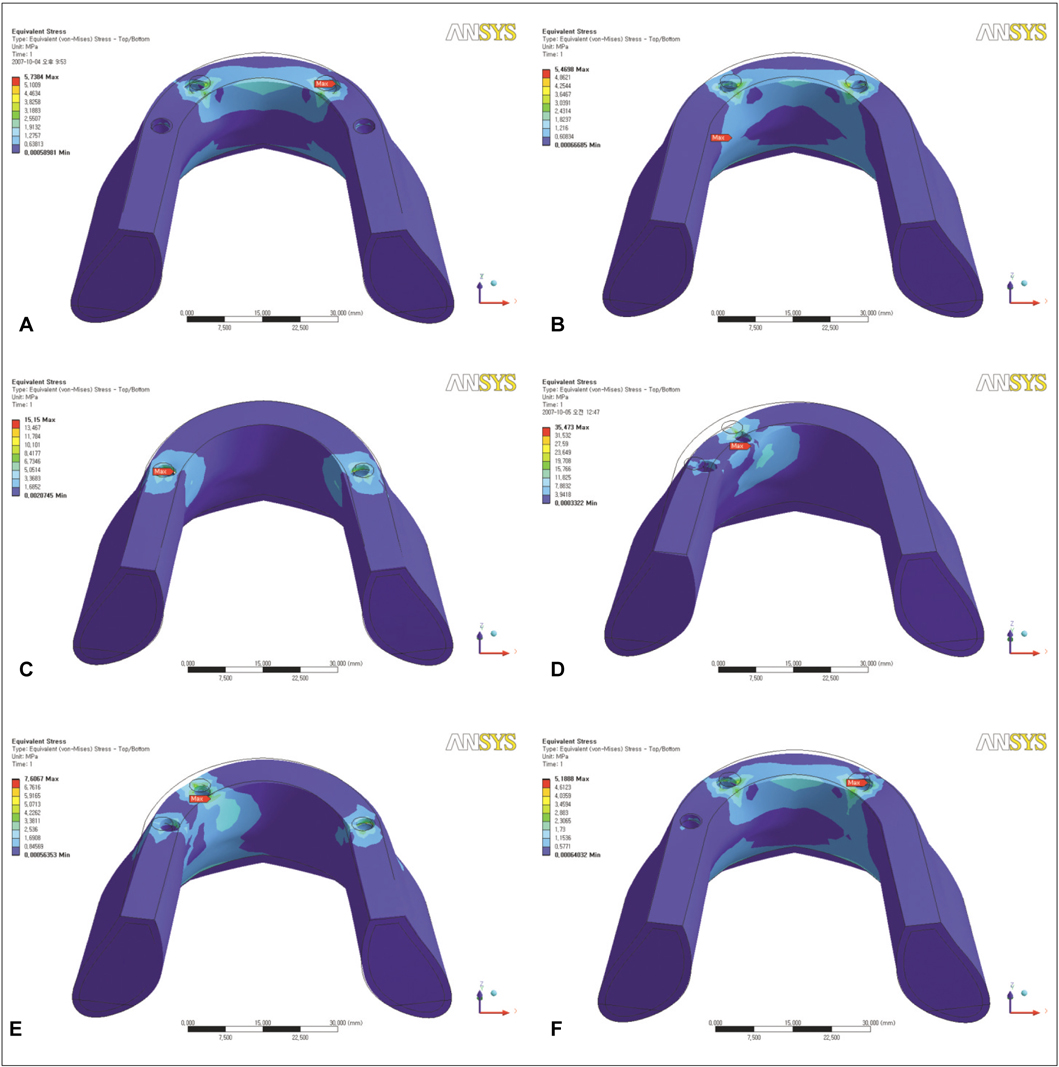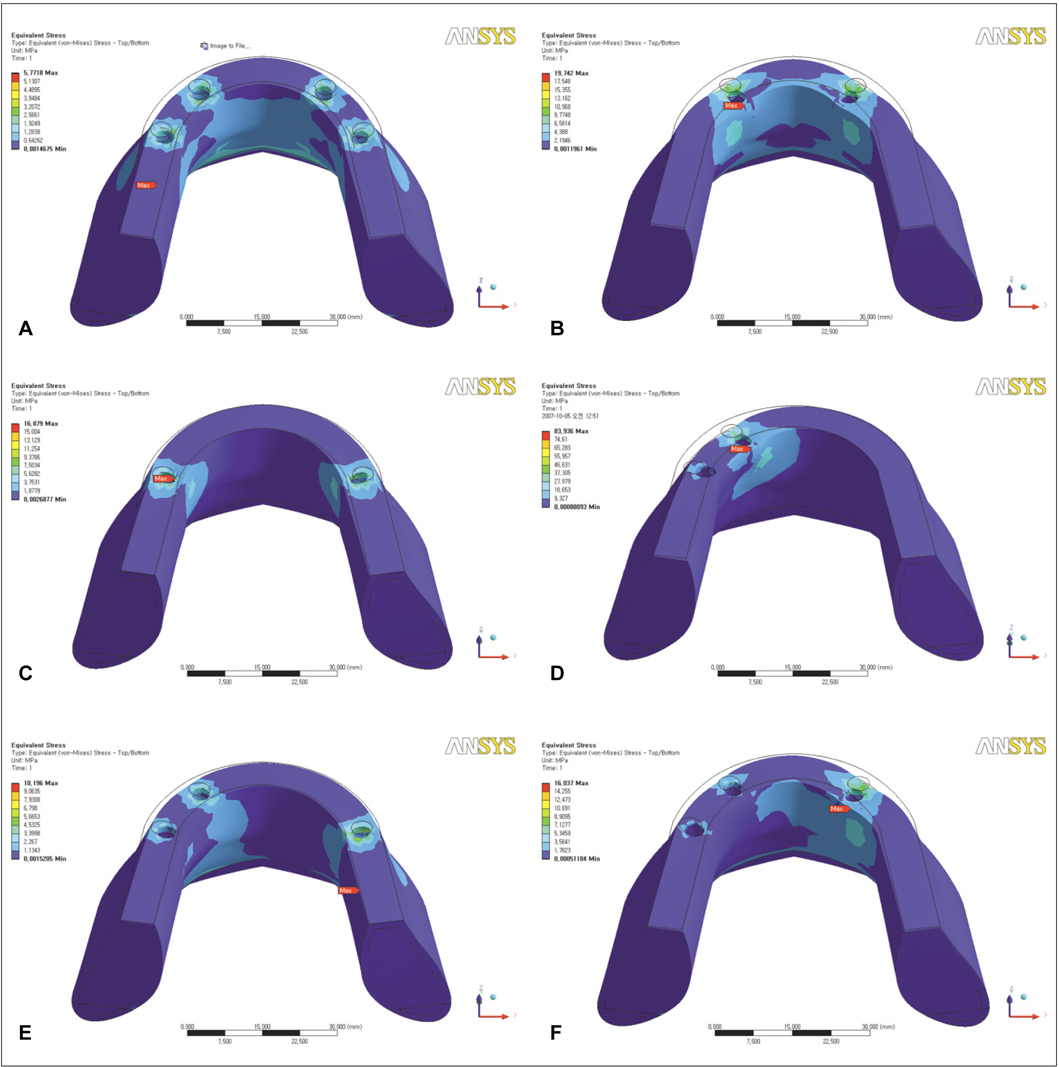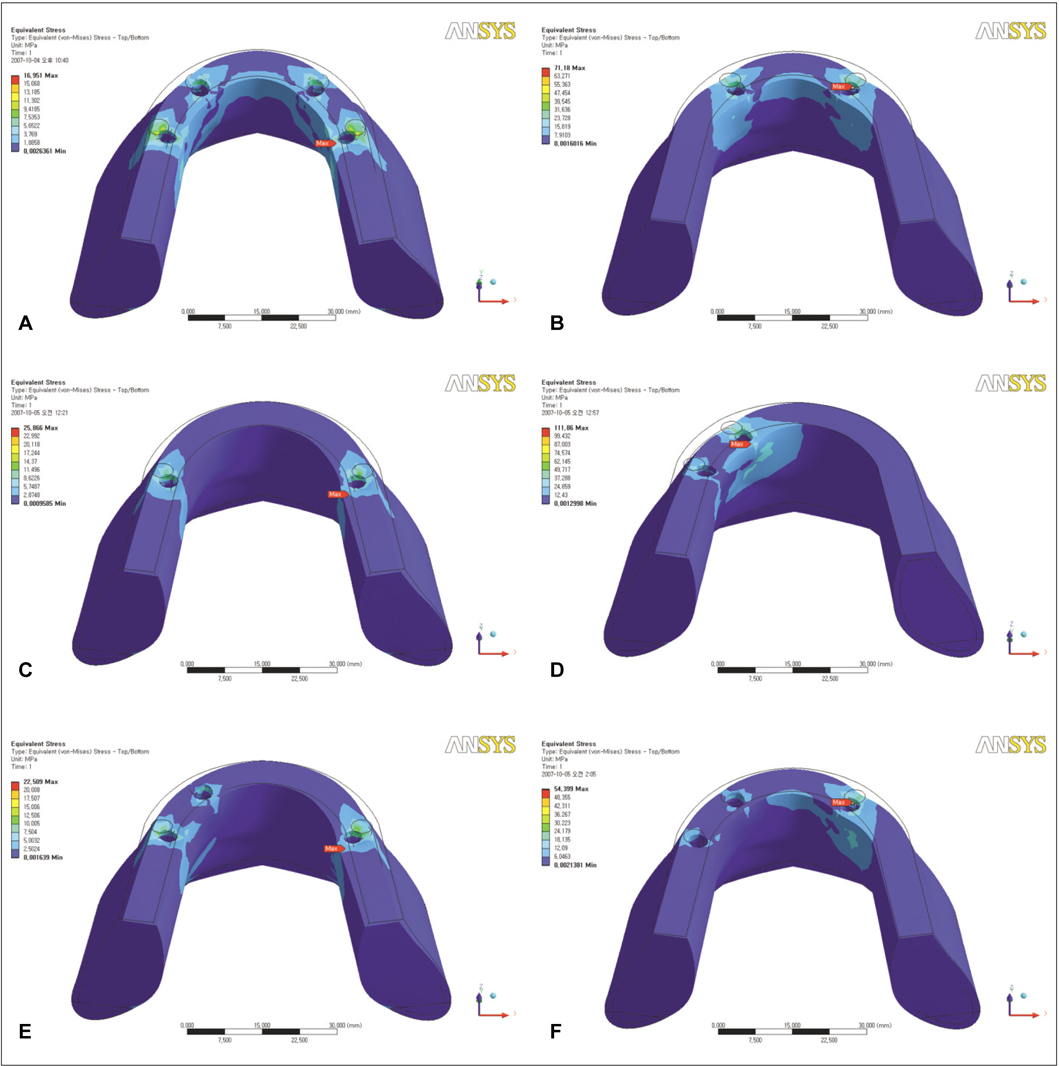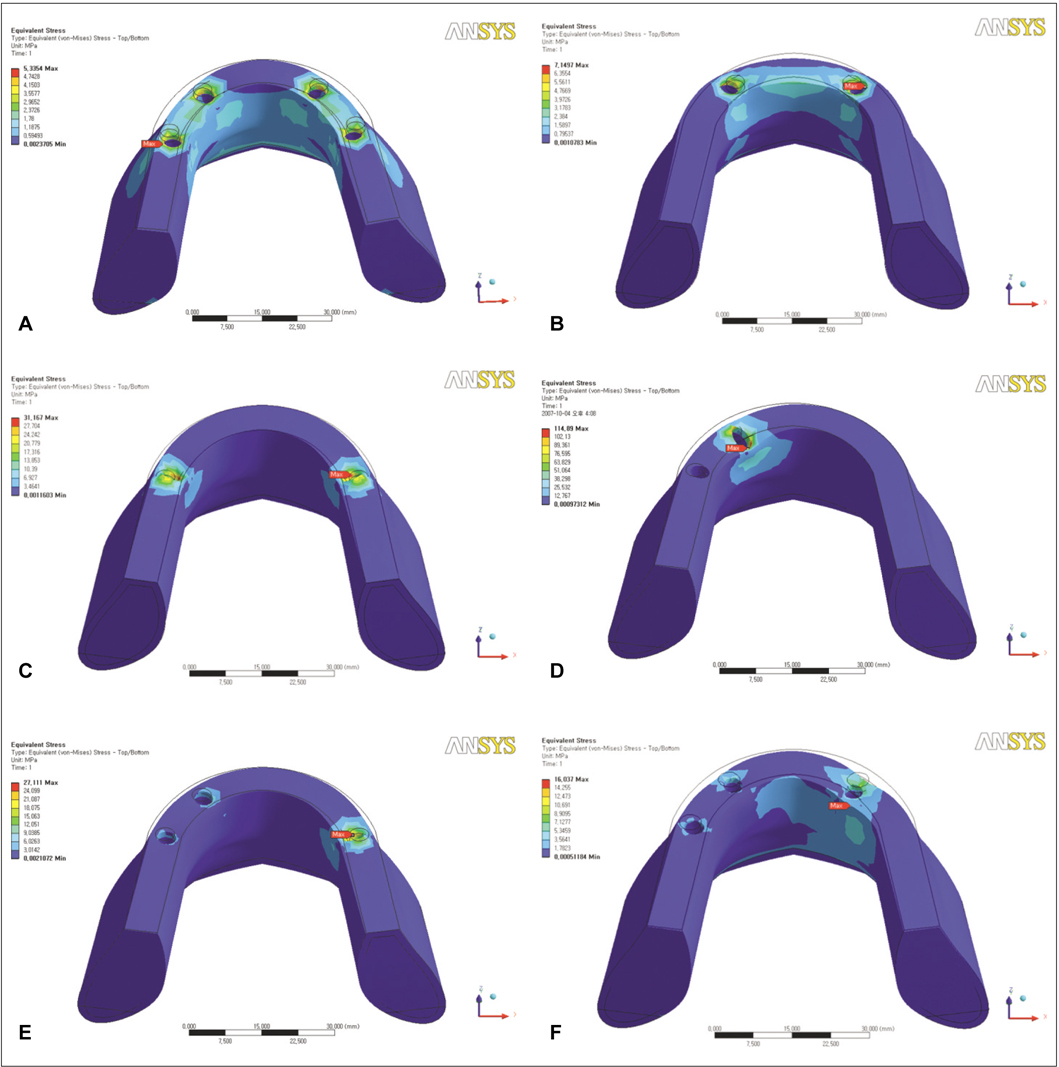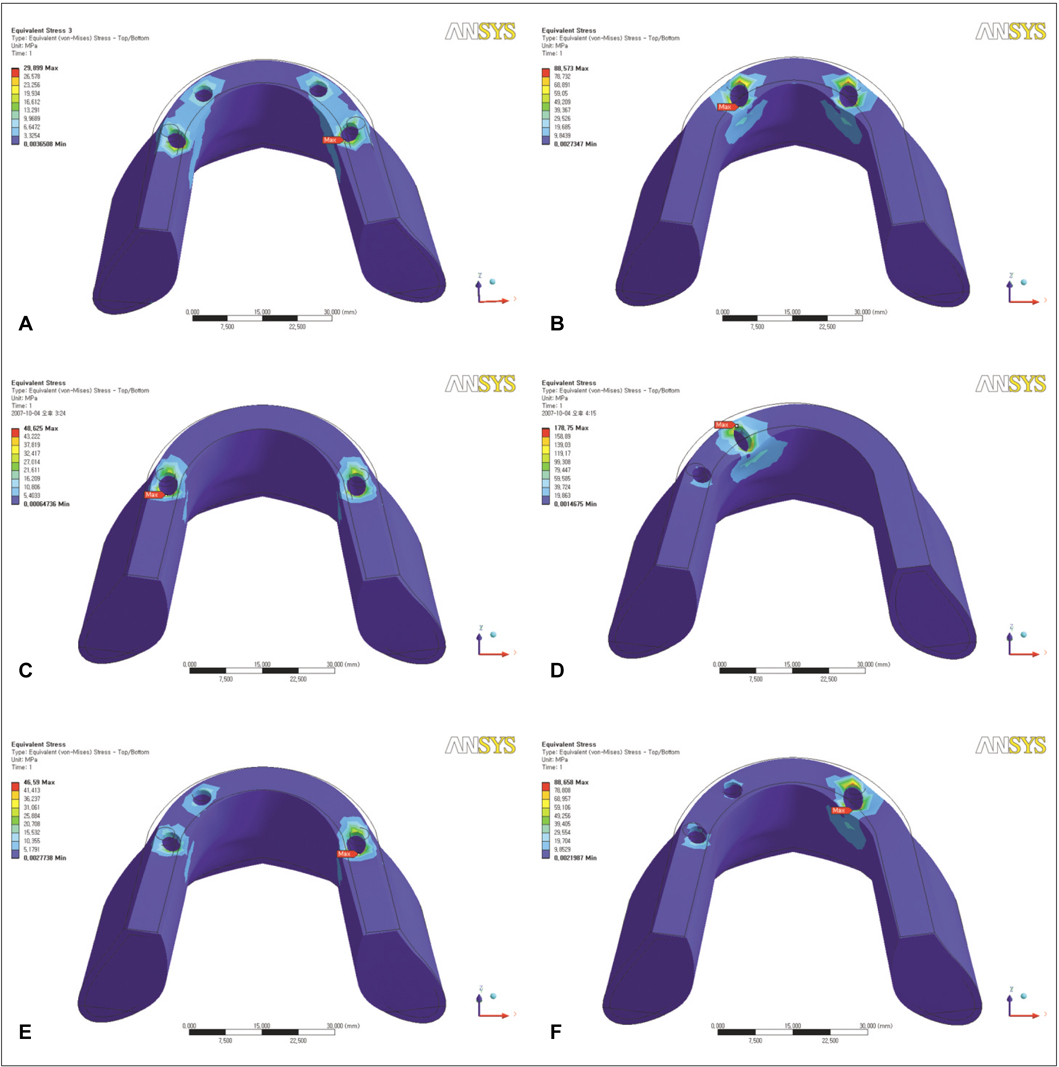J Korean Acad Prosthodont.
2012 Jan;50(1):10-20.
A FEM study on stress distribution of tooth-supported and implant-supported overdentures retained by telescopic crowns
- Affiliations
-
- 1Department of Prosthodontics, School of Dentistry, Kyung-Hee University, Seoul, Korea. yhwoo@khu.ac.kr
Abstract
- PURPOSE
The purpose of this study was to investigate the stress distribution in mandibular implant-supported overdentures and tooth-supported overdentures with telescopic crowns.
MATERIALS AND METHODS
The assumption of this study was that there were 2, 3, 4 natural teeth and implants which are located in the second premolar and canine regions in various distributed conditions. The mandible, teeth (or implants and abutments), and connectors are modeled, and analyzed with the commercial software, ANSYS Version 10.1. Stress distribution was evaluated under 150 N vertical load bilaterally on 3 experimental conditions - between canine areas, canine and 2nd premolars, 10 mm posterior to 2nd premolars.
RESULTS
Overall, the case of the implant group showed more stress than the case of the teeth group in stress distribution to bone. In stress distribution to superstructures of tooth and implants, there was no significant difference between TH group and IM group and the highest stress appeared in TH-IV and IM-IV. The stress caused from bar was much higher than those of implant and tooth. TH group showed less stress than IM group in stress distribution to abutment teeth and implant.
CONCLUSION
The results shows that it is crucial to make sure that distance between impact loading point and abutment tooth does not get too far apart, and if it does, it is at best to set abutment tooth on premolar tooth region. It will be necessary to conduct more experiments on effects on implants, natural teeth and bone, in order to apply these results to a clinical treatment.
MeSH Terms
Figure
Reference
-
1. Brewer AA. Overdentures. 1980. 2nd ed. St. Louis: Mosby.2. Fanuscu MI, Caputo AA. Influence of attachment systems on load transfer of an implant-assisted maxillary overdenture. J Prosthodont. 2004. 13:214–220.
Article3. van Kampen F, Cune M, van der Bilt A, Bosman F. Retention and postinsertion maintenance of bar-clip, ball and magnet attachments in mandibular implant overdenture treatment: an in vivo comparison after 3 months of function. Clin Oral Implants Res. 2003. 14:720–726.
Article4. Heckmann SM, Schrott A, Graef F, Wichmann MG, Weber HP. Mandibular two-implant telescopic overdentures. Clin Oral Implants Res. 2004. 15:560–569.5. Engquist B, Bergendal T, Kallus T, Linden U. A retrospective multicenter evaluation of osseointegrated implants supporting overdentures. Int J Oral Maxillofac Implants. 1988. 3:129–134.6. Hutton JE, Heath MR, Chai JY, Harnett J, Jemt T, Johns RB, McKenna S, McNamara DC, van Steenberghe D, Taylor R, et al. Factors related to success and failure rates at 3-year follow-up in a multicenter study of overdentures supported by Braånemark implants. Int J Oral Maxillofac Implants. 1995. 10:33–42.7. Johns RB, Jemt T, Heath MR, Hutton JE, McKenna S, McNamara DC, van Steenberghe D, Taylor R, Watson RM, Herrmann I. A multicenter study of overdentures supported by Braånemark implants. Int J Oral Maxillofac Implants. 1992. 7:513–522.
Article8. Lekholm U, Zarb GA. Braånemark PI, Zarb GA, Albrektsson T, editors. Patient selection and preparation. Tissue integrated prostheses: Osseointegration in clinical dentistry. 1985. Chicago: Quintessence;199–209.9. Goodacre CJ, Kan JY, Rungcharassaeng K. Clinical complications of osseointegrated implants. J Prosthet Dent. 1999. 81:537–552.
Article10. Naert I, De Clercq M, Theuniers G, Schepers E. Overdentures supported by osseointegrated fixtures for the edentulous mandible: a 2.5-year report. Int J Oral Maxillofac Implants. 1988. 3:191–196.11. Yokoyama S, Wakabayashi N, Shiota M, Ohyama T. Stress analysis in edentulous mandibular bone supporting implant-retained 1-piece or multiple superstructures. Int J Oral Maxillofac Implants. 2005. 20:578–583.12. Ralph WJ. The effects of dental treatment on biting force. J Prosthet Dent. 1979. 41:143–145.
Article13. Heckmann SM, Winter W, Meyer M, Weber HP, Wichmann MG. Overdenture attachment selection and the loading of implant and denture-bearing area. Part 2: A methodical study using five types of attachment. Clin Oral Implants Res. 2001. 12:640–647.
Article14. Menicucci G, Lorenzetti M, Pera P, Preti G. Mandibular implant-retained overdenture: finite element analysis of two anchorage systems. Int J Oral Maxillofac Implants. 1998. 13:369–376.15. Krennmair G, Seemann R, Weinla¨nder M, Piehslinger E. Comparison of ball and telescopic crown attachments in implant-retained mandibular overdentures: a 5-year prospective study. Int J Oral Maxillofac Implants. 2011. 26:598–606.16. Curry J. The mechanical adaptations of bones. 1984. Princeton University Press.
- Full Text Links
- Actions
-
Cited
- CITED
-
- Close
- Share
- Similar articles
-
- Erratum: A FEM study on stress distribution of tooth-supported and implant-supported overdentures retained by telescopic crowns
- Use of polyaryletherketone (PAEK) based polymer for implant-supported telescopic overdenture: A case report
- Finite Element Analysis of Stress Distribution on Telescopic System for Mandibular Implant Supported Overdenture
- Overdentures using newly designed metal ball attachment containing predetermined gap with stress breakers
- Clinical outcome of double crown-retained implant overdentures with zirconia primary crowns


